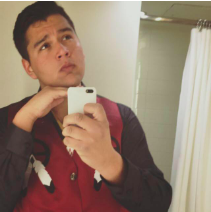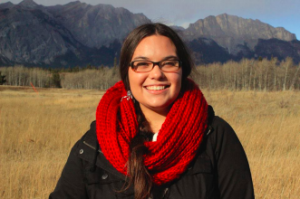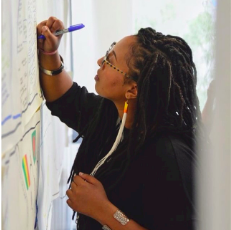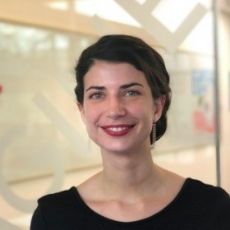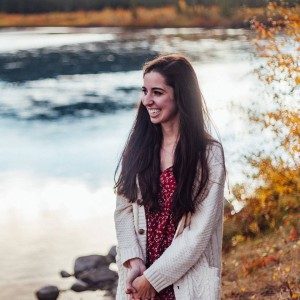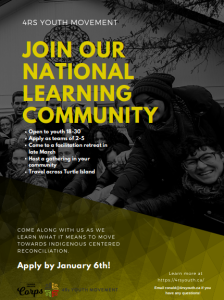Introducing our New Team Members
written by Alexandra Daignault
When I first landed in Baawating [Sault Ste. Marie], I had a minor anxiety attack. I thought I had landed in P.E.I and was going to have to explain to my new Executive Director, Jess, that I had messed up my first and only task as a Special Projects Assistant – getting on an airplane to my very first meeting. Having been traveling for the better part of two weeks, I was exhausted, hungry, and in desperate need of some sleep.
It was from there, that we began our journey of getting there. I mean this literally in the sense that it was a process to arrive, collect all the team members, thank the land, arrange for missing luggage to be delivered, and for us all to find our way through windy autumn roads to our cabin in the woods.
Over the course of the next two months, we would spend our time working remotely, and traveling together in Baawating (Jess’s home in Anishinaabe territory) and Ottawa (unceded, unsurrendered Algonquin territory). One of the adventures that I will hold closest to my heart as we do this work is the time we spent at NIMKII AAZHIBIKONG – “a place where youth and Elders come to connect to the land, each other and to pass down the language and traditional knowledge to the next generations.” It represented a significant moment in coming together for the team, and it felt like an auspicious beginning to be working within community.
Metaphorically, this time together has been a process of getting there – getting to a space where we can operate as a team. But to really get there, and share this story — it’s time we introduce the newest members of the 4Rs core team.
Ronald Gamblin | National Learning Community Coordinator
I find that my “getting here” is better described as my rediscovery. To preface everything a bit, my background is Anishinaabe (Ojibway) / Maskékowak (Swampy Cree), alongside some Red River Metis. My mother’s side mainly comes from northern Manitoba, and while my father grew up in Winnipeg, the rest of the family grew up in southern Metis communities. At one point my mother decided to move down to Winnipeg where she met my dad, in the north end of Winnipeg, where I was born shortly after.
Unlike too many people in my situation, I grew up with my culture. I was given a spirit name close to birth, my family used to belong to a powwow group, and we went to ceremony. At one point all of that was ‘disrupted’, when we moved away from the north end (the area of the city with one of the highest Indigenous populations), to an area that rarely acknowledged Indigenous realities.
My official title is the 4Rs youth movement National Learning Community (NLC) Coordinator. The way I like to describe it, is that I look for amazing young people who are helping their community, and support them by providing extra resources and connecting them with other amazing young people across turtle island.
I actually came across this position because of community supporting work I was already doing. This past summer I left to Ottawa (unceded Algonquin territory) for work. While in Ottawa I was involved with an Indigenous led youth org Assembly of 7 Generations (A7G). A7G looked to give space for Indigenous young people to create meaningful relationships, learn about their own culture, and to decide how they would like to see their community change. Nearing the end of my time in Ottawa I came across the position with 4Rs and the A7G group supported me in applying for the position.
The scariest part about the job is the question of whether or not my actions will result in a beneficial change in the young people’s lives, their communities, and the larger community that we bring together. Being so involved in my own community, I understand how a lot of times programs like this can mean the difference between life or death for a lot of Indigenous young people.
The most exciting part is knowing the sense of happiness that will come out of this work. For me, what makes this work worth it, is seeing another young person be happier. To some this may seem like an answer that lacks depth, but I find that people in this kind of work go to very theoretical levels and forget that the baseline goal of the work is to make young people happier.
Lacey Hawranik | Cultural Coordinator
The position that I am holding within the 4Rs is the Cultural Coordinator. This role came out of realizing that there are many moving parts of the work of the 4Rs that directly relates to “culture”. The main focuses of my role are to support the healthy growth and development of the culture that the 4Rs network is co-creating, while also supporting accountability and capacity building within our network and partners around what it means to meaningfully engage Indigenous Youth and Communities in processes that are rooted in the 4Rs (Respect, Reciprocity, Reconciliation, and Relevance).
At this point as the next chapter of 4Rs history is unfolding there are so many things that I am dreaming of now regarding the collective work that we are doing. One of the most exciting things for me currently is anticipating the new relationships that are going to be fostered with youth across northern Turtle Island. Every one of the youth that enter into the 4Rs network bring with them a wealth of experience, innovation and wisdom that has has the potential to feed, grow and support the other members of the network in all of the important work that is currently being done. Getting the chance to connect young people who are doing this work (often in isolation), and foster the conditions necessary for co-created learning and support is a gift to me.
Muna Mohamed | Systems Educator
My history and ancestry traces back to East Africa. My parents migrated to algonquin territory (now known as Ottawa) from Addis Ababa, Ethiopia in 1994. They are both of the gurage ethnic group in Ethiopia and belong to the Wendemene clan in the southern region of Ethiopia. I name this history of migration because it’s critical to how I place myself in my work as a second-generation Muslim Ethiopian woman working within an Indigenous led movement. My getting here process has been greatly influenced by the teachings of my mother, my grandmother and the generations before them.
My title on the 4Rs team is Systems Educator. I am essentially supporting some national youth serving organizations in continuing, deepening or starting their learning on shifting their programming through an anti-racist and reconciliation based lens.
The scariest and most exciting piece of the work are the same for me. I think a lot about ripple effects in social change work (from the individual, to community to systems) and have so much excitement at the opportunity to inform systems level change. The challenge that presents itself with this new sphere of influence is about informing individual change and shifts while working at such a high level. I think that at the core of our social change work is a critical reflective practice. In the work of truth and reconciliation, it means consistently peeling back the layers of our social positioning, our history, our ancestry and the varying levels of power we carry in our many roles.
Moments that have helped me get there are moments where i’ve felt deeply uncomfortable, questioned my identity and have been called into challenging conversations. I think that growth, when truly transformative, never feels comfortable. Key to my journey to getting there has been shifting my work and focus from the similarities between black and indigenous communities (understanding that neither is mutually exclusive) but to sit with the discomfort of being a settler and the many anti-Indigenous sentiments that exist in black spaces that I am a part of. I have learned that engaging in true cross community solidarity work means taking a step back, listening and accepting when I’m wrong.
Floriane Lemoine | Evaluations Coordinator
I’m proud and grateful to be 4Rs Evaluation Coordinator. This is very much a dream job for me, regarding both the field and the mission. More specifically, at 4Rs my role is to act as a “seedbank”, whereby I save the seeds harvested from our communities, organize them and try to make sense of them. This means that I will build, implement, and analyze evaluation plans for our National Learning Community, our role as systems and cultural competency educator among our partners, as well as our growth as a team. A group of community researchers and youth story-tellers will support me in that mission.
Being White, from a developed country and a middle-class family, I consider myself as being very privileged. Giving back is essential to me, and I have always tried to support the marginalized members of the community where I live, at my very modest scale.
Homelessness has always been a cause close to my heart, and it’s when I discovered the proportion of Indigenous homeless in Montréal that I started unraveling the very complex thread of colonization and systemic racism in Canada. I wanted to do my share, and yet as a White settler I was aware that my country had played an instrumental role in the colonial process. I was trying to educate myself, and yet I felt how deep my knowledge gap was, and still is. I was hoping to be accepted in the reconciliation process, but was unsure where and when involvement was needed, and when to leave space.
When I came across 4Rs, I was struck by how holistic and inclusive the movement was, while still not being afraid to tell some hard truths. As I was scrolling through their recent posts, I discovered that not only were they hiring, they had an opening that was exactly what I was looking for: a position in social impact measurement!
This position presents two big challenges for me:
As a newcomer on this part of Turtle Island (also known as Canada), the work of reconciliation is very new to me. I feel very privileged to be given the chance to be part of this process and to be able to learn more about Indigenous worldviews, cultures and battles, and yet the extent of what I need to learn can be daunting at times! Trying to become an Ally also involves a lot of uncomfortable and yet necessary questioning about my own culture, worldview and identity.
I have experience and training in the field of evaluation, but this particular mission is nothing like I’ve ever seen before! It’s extraordinarily complex, with levels of evaluation going from the systemic one to the organizational and individual one…all at the same time! I also need to be mindful that evaluation can be a very Western concept, and my work with the team will be to try to decolonize it.
After writing that I realize that the scariest parts…are also the most exciting to me! I’m also thrilled to be part of such a diverse, skilled and committed team!
Alexandra Daignault | Special Projects Assistant
And then there’s me: Alexandra. I am a mixed race Indo-Caribbean Settler. I was born on traditional Treaty 7 territory, on the homelands of the Niitsitapi (the Siksika, Piikani, Kainai), the Îyârhe Nakoda, Tsuut’ina, and Metis Region III, Nations. As a White passing Settler, I acknowledge the treaty relations that have not been honoured and the privileged position this has created for me. I am committed to doing the work daily to restore good relations.
Currently, I’m a special projects assistant for the 4Rs Youth Movement – working in communications and logistics – with a focus on building and caring for our network relationships (Yes – that means all of you should feel free to email me anytime!) I came to this work through my work as a core facilitator and helper person for the movement over the years. As someone who is mixed race and white passing, but still lives in the diaspora, I want to learn everything I can about what makes a strong accomplice – as well as how we build solidarity between communities to create systemic change. Currently, I operate a small tea company called Sarjesa Inc., and I try to steep social activism into the fabric of my life.
Sometimes I feel like I don’t know what I’m doing – but I think that’s part of the work. None of us really know the way forward, but we are committed to working together to find a way forward that is grounded in reciprocity and respectful solidarity… I think… perhaps I’m wrong?
Over the past two months, we have been doing the work of “getting there” as a team. This has meant learning how to work together remotely, managing conflict and different communication styles, while also finding a rhythm within our own work. What the team teaches me everyday is the concept of working together even when you are standing on uneven ground. As a mini ecosystem, we all have different strengths and areas of growth, so learning how to work collaboratively and celebrating our differences has been something that is really important to the process.
As we move towards a new year full of exciting new things (Did you see our callout for our 2019 NLC cohort? APPLY HERE) we are so looking forward to getting to know each of you within the 4Rs space!

